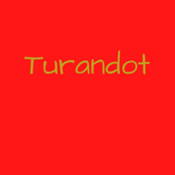
Overview
Synopsis
The famous tale of Turandot revolves around the cold-hearted Princess of Peking, Turandot, and the young Prince of Tartary, Calaf, who falls in love with her at first sight. Having deemed all men unworthy of her hand, Turandot requires her suitors to answer three riddles correctly, and if he fails, he is beheaded. Calaf attempts the riddles against the warnings of his father Timur, his father’s servant, Liù (who is secretly in love with him), and the ministers Ping, Pang, and Pong. Successfully answering the riddles, Calaf insists that Turandot marry him for love, so tells her if she can discover his name by morning, he will die for her. Turandot locks down the kingdom, and tortures everyone to try to discover his name, including Liù, who takes her own life to save Calaf. Finally, Calaf reveals himself to Turandot, and leaves his life in her hands. As he kisses her, Turandot gives into her love for him and announces to her father that she has discovered his name; “Love!” The kingdom rejoices the couple’s union, and the melting of Turandot’s cold heart.
Show Information
Context
Puccini first discovered the play in its adapted version by Friedrich Schiller; however, the libretto is based on the story, "Turan-Dokht", from a book of work by a Persian poet from the 12th Century, Nizami. The famous story of Turandot was adapted and translated into different languages from the Persian collection "The Book of One Thousand and One Days." Puccini met with Adami and Simoni in 1920 to begin the work on the libretto. Puccini did not live to write the end of the opera, only
to read the context for Turandot and to unlock other amazing theatre resources!Plot
Act One
A man announces the law pertaining to the Princess Turandot; "Any man who desires to wed Turandot must first answer her three riddles. If he fails, he will be beheaded." Many suitors have attempted to win the hand of the Princess Turandot, but none have succeeded and all been led to their deaths. The Prince of Persia has just failed to answer the riddles and is sentenced to be beheaded at moonrise. The gathering crowd in front of the Palace is beaten back by the imperial guards, and an
to read the plot for Turandot and to unlock other amazing theatre resources!Characters
| Name | Part Size | Gender | Vocal Part |
|---|---|---|---|
|
Lead |
Female |
Soprano |
|
|
Lead |
Female |
Soprano |
|
|
Lead |
Male |
Tenor |
|
|
Lead |
Male |
Bass |
|
|
Supporting |
Male |
Baritone |
|
|
Supporting |
Male |
Tenor |
|
|
Supporting |
Male |
Tenor |
|
|
Featured |
Male |
Tenor |
|
|
Featured |
Male |
Baritone |
|
|
Featured |
Male |
Tenor |
|
|
Ensemble |
Either Gender |
Soprano, Mezzo-Soprano, Contralto, Tenor, Baritone, Bass |
Songs
Act One
- Scena 'Popla di Pekino!' (Mandarino, Liù, Prince Calaf, Timur, Chorus)
- Invocation to the Moon 'Gira la cote!' (Chorus)
- 'O giovinetto! Grazia, grazia' (Chorus, Prince Calaf)
- Scena 'Figlio, che fai?' (Prince Calaf, Timur, Chorus)
- 'Ferma! Che fai?' (Ping, Pang, Pong, Prince Calaf, Timur, Chorus)
- Aria 'Signore ascolta!' (Liù)
- Aria 'Non piangere Liù' (Prince Calaf)
- Scene 'Noi morrem sulla strada' (Prince Calaf, Liù, Timur, Ping, Pong, Pang, Chorus)
Act Two
- Ministers’ Trio 'Ola, Pang! Ola, Pong!' (Ping, Pang, Pong)
- March of the Mandarins 'Gravi, enormi ed imponenti' (Chorus)
- Scena 'Un giuramento atroce' (L'imperatore, Prince Calaf, Chorus)
- Scena 'Popolo di Pekino!' (Mandarino, Chorus)
- Aria 'In questa reggia' (Turandot, Chorus)
- Scena 'No! No! Gli enigmi' (Prince Calaf, Turandot, Chorus)
- Scena 'Straniero, ascolta!' (Turandot, Prince Calaf, Chorus)
- Scena 'Non perditi, straniero!' (L'imperatore, Chorus, Liù, Prince Calaf, Turandot)
- Aria 'Figlio del cielo' (Turandot, L'imperatore, Chorus, Prince Calaf)
Act Three
- Introduction 'Cosi comanda Turandot' (Heralds, Chorus)
- Aria 'Nessun dorma' (Prince Calaf, Chorus)
- Scena 'Tu che guardi le stelle' (Ping, Pong, Pang, Prince Calaf, Chorus)
- Scena 'Eccolo il nome!' (Soldiers, Chorus, Prince Calaf, Ping, Pong, Pang)
- 'Sei pallido, straniero!' (Turandot, Prince Calaf, Liù, Chorus, Ping, Pang, Pong, Timur)
- Aria 'Tanto amore segreto' (Liù)
- 'Strapatele il segreto!' (Turandot, Prince Calaf, Chorus, Ping, Liù, Pong, Pang)
- Aria 'Tu che di gel sei cinta' (Liù)
- Scena 'Ah! parla! parla!' (Chorus, Prince Calaf, Timur, Ping)
- Duet 'Principessa di morte!' (Turandot, Prince Calaf, Chorus)
- Aria 'Del primo pianto' (Turandot, Calaf)
- Finale: O sole! Vita! Eternità! (Chorus, Turandot)
A song with an asterisk (*) before the title indicates a dance number; a character listed in a song with an asterisk (*) by the character's name indicates that the character exclusively serves as a dancer in this song, which is sung by other characters.
Monologues
Scenes
Key Terms
Sorry! We do not currently have terms for this guide.
Videos
Quizzes
Themes, Symbols & Motifs
Sorry! We do not currently have learning modules for this guide.
Quote Analysis
Sorry! We do not currently have learning modules for this guide.